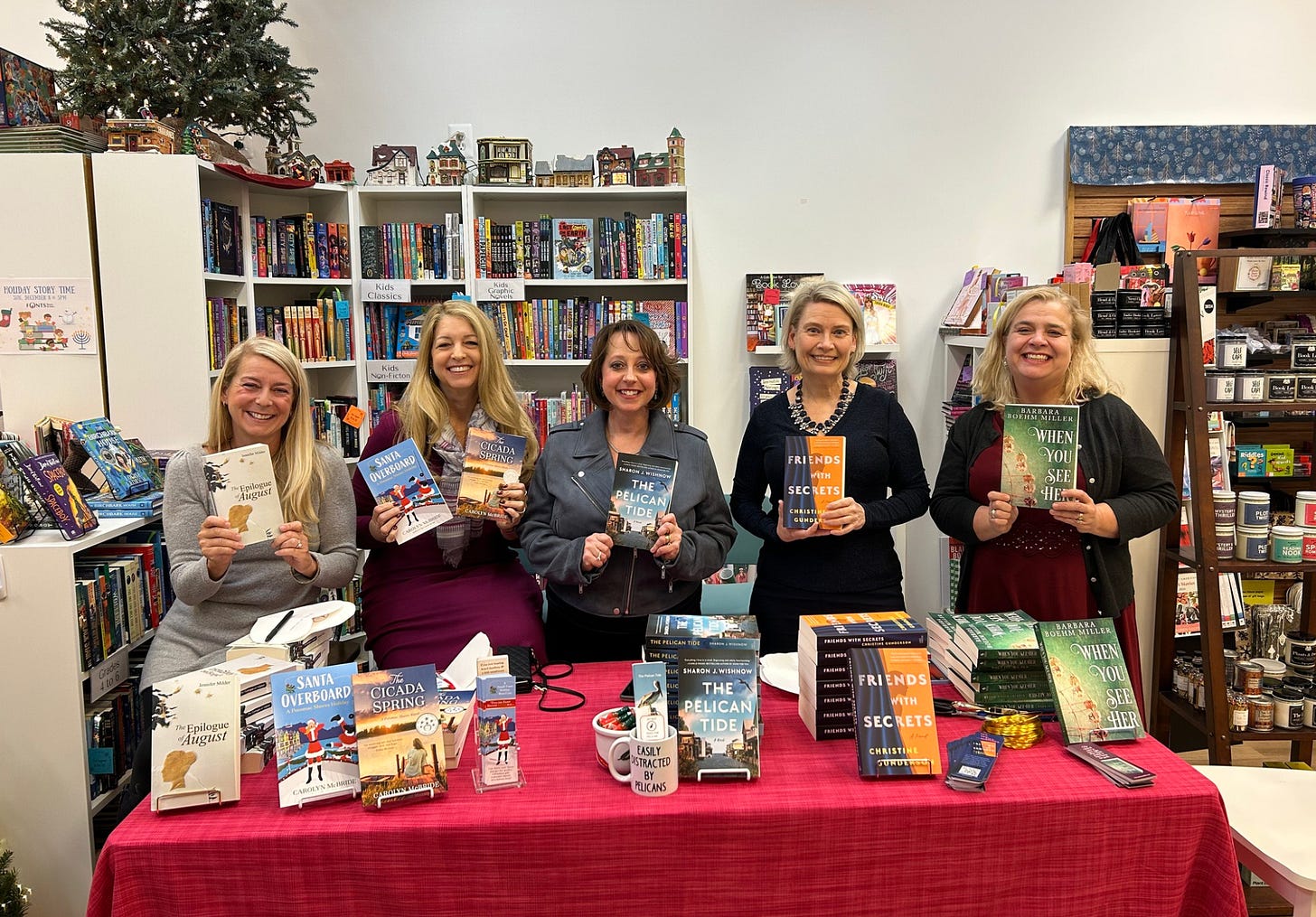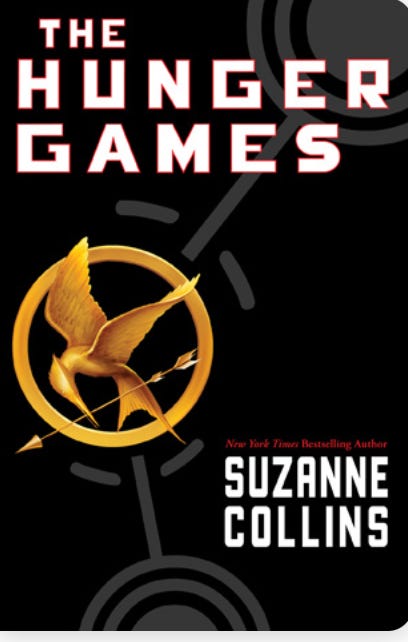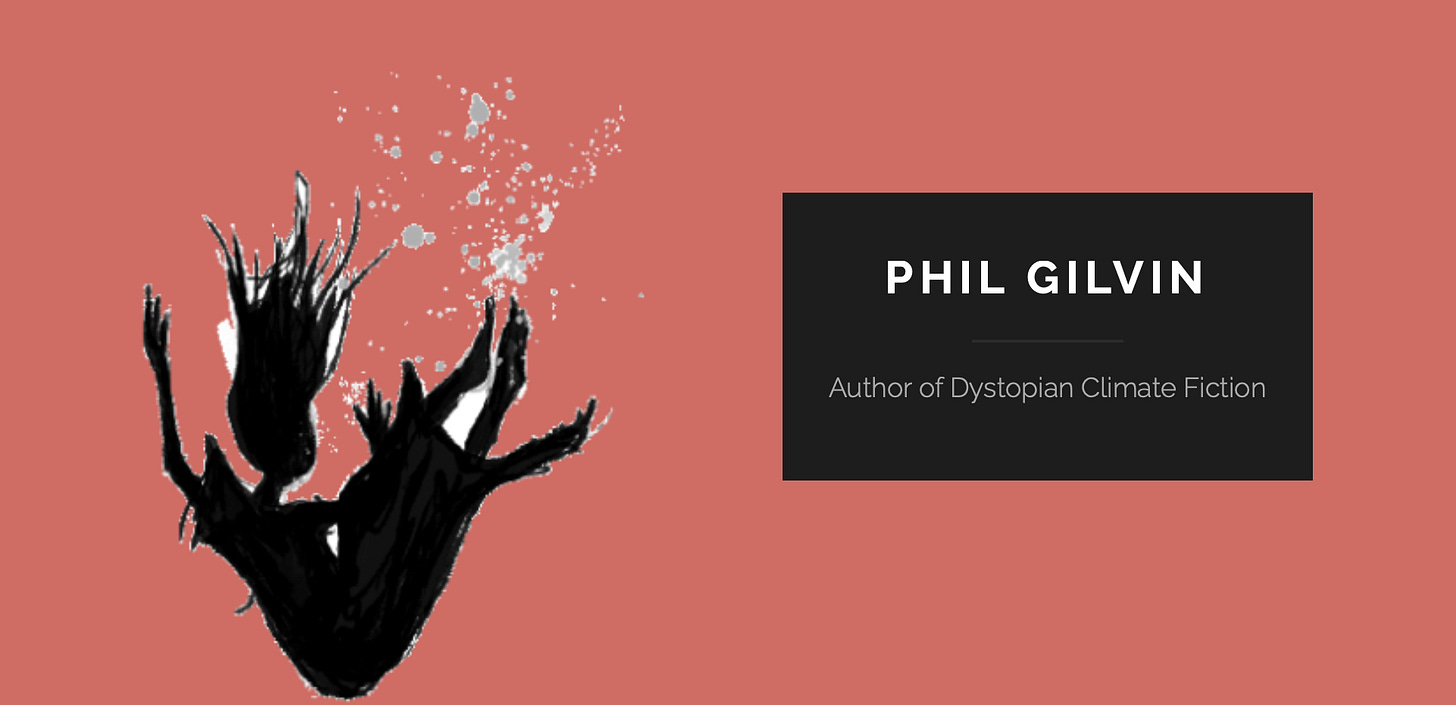Dystopian, but with a Smile
Phabulous Phil Gilvin Book Give Away
Hi, Everyone,
Welcome to my new subscribers and friends from many of my recent book events. And a shout out to my favorite new author collaboration, Sisters of the Traveling Pen that was formed with writers from the Northern Virginia Writer’s Club. We had our first event this month at Font Books in McLean Virginia where we each spoke about our novels. A portion of the evening’s sales was donated to a local charity. I’m the only brunette in the middle. And fun fact, both Jennifer Milder and Carolyn McBride are sitting in this photo while I’m standing. Yes, I’m that short!
We have future events scheduled. Stay tuned.

In Other Book News
I recently finished the draft of what I hope is my next novel. It’s with my agent so now…I wait.
But that’s okay (not really) but I can play again with words. When I finish a huge project, I like to try writing something completely different. And I’m leaning dystopian as world events have rained on us.
This issue includes a BOOK GIVEAWAY from my fellow Climate Fiction Writers League author Phil Gilvin who has been generous with my how do you craft it questions about dystopian stories.
Phil and I share an authorial interest in climate change fiction. The Pelican Tide is about the environmental damage caused by the 2010 Deepwater Horizon Oil spill and a pelican, among other twists and turns..
Phil’s Truth Sister trilogy explores a matriarchal society where the purest of the pure are cloned. It’s set in a future London-esque city that is grappling with climate uncertainties. Phil has created a new society based on rituals, power, and privilege. His world-building alone had me hooked as I considered how this new world became a character within the story, and how the characters moved through it.
What is Dystopian Fiction?
I needed to start at the top because when it comes to playing in a new genre, you must understand the rules and the “beats” these are the elements that readers expect. It’s also helpful to know the cliches so you can avoid them and truly develop something fresh.
Dystopian fiction presents a future where a society is in decline. This is often brought on by war, disease climate change, authoritarian governments, and other cheery ideas. The main characters are fighting their world and the story problems and villains. Stories often have altered societal expectations and norms with stressors like maybe a famine or water shortage.
As a genre, it’s often political, a way for a writer to expose unsavory elements of society.
This online guide from Writing Oasis is great. I especially like the dystopian cliches to avoid. It also had me saying ah-ha! this is why so many stories have these elements.
One of my favorite modern dystopian series is Suzanne Collins’ The Hunger Games. Both the books and the movies are great storytelling. But as a reader who doesn’t gravitate to the genre, I wonder if the stories thrilled me and were “fresh” because they were new (to me). Did regular readers of the genre see all the tricks? Or maybe that’s why it does work because Collins provides what we want in an imaginative way?
Common Dystopian Cliches Source: Writing Oasis
Oppressive government that gets toppled;
Beasts on the outside of a community fence
Limitation of knowledge and information
Controlling communications
The hero who is genetically engineered to be so
An extreme divide between the rich and the poor;
The hero who topples the government was pursued by that very same government.
Yes, it’s Science Fiction
Dystopian fiction is a sub-genre of science fiction. Phil Gilvin is an actual scientist and comes to his stories with a foundational education. Climate fiction explores how climate is changing the natural world and humans place in that world.
Dystopian fiction has always had worlds wrecked by natural disasters, but as a climate fiction author the story is more than about the weather.
Let’s delve into my conversation with Phil, and at the end you can enter the giveaway, I promise!
Sharon: When you're writing, what comes first, the dystopian world or the climate change or does one inform the other?
Phil: Hmm. To begin with, I wanted to warn people about climate change. The idea of a warning led naturally to a dystopia, although in Truth Sister the situation has been exacerbated by pandemics and by dwindling natural resources. (Cheerful, eh?)
You could argue that climate change is going to plunge us into a world so unlike this one, that it’s bound to be “dystopian”. So in that way, climate change is a cause of the dystopia. I guess it is possible, however, to imagine a society that has adapted smoothly to climate change, without any of the malfunctioning that creates a dystopia. Now that would be fiction!
Sharon: Environmental disasters are a common trope in dystopian fiction. How do you differentiate writing clifi with writing dystopian. Where do they intersect in your stories?
Phil: A climate-changed society isn’t necessarily a dystopian one, although that will be more likely. As regards to environmental disasters, there’s no doubt that the temperature rises to which the world is already committed are going to cause species extinctions and economic dislocation; but those effects will be more gradual than in the kind of cataclysm depicted in, say, The Day After Tomorrow. That’s what I’ve tried to envisage in the Truth Sister books: a world where the slow onset of disasters has made some adaptation possible.
There’s a range of predictions about what’s going to happen to the climate. If I want to “warn” readers, I don’t feel I should exaggerate. So I tried to stay within the uncertainties. For example, the 4 m sea-level rise that, in the Truth Sister books, floods the lower town of Christchurch, Dorset (amongst other things!) – is a possible scenario.
I love what Phil says here about adaptations as that unleashes so much creativity. What can I writer invent to adapt. A new language, a new transportation system, new sources of food and energy, new rules and classes.
Sharon: What about dystopian stories interests you?
Phil: As a teenager I was captivated by H G Wells (War of the Worlds) and John Wyndham (Triffids, Chrysalids). I suppose dystopian stories allow for believable leaps of the imagination – i.e. without the need to invent interstellar travel or hostile aliens. Dystopian situations also put pressure on characters, allowing us to explore what they’ll do – and hence what we’d do ourselves. Finally, dystopia, like Gilead in The Handmaid’s Tale, often have a resemblance to our own society – so they make for more effective warnings.
Sharon: What do you develop first, the world/setting or the characters?
Phil: I have to have both aspects developed – at least partly – before I start writing. With Truth Sister, I got the ideas and images for the privileged pupils at “The Academy”, which led me to several of the main characters and what their functions were. Plot guides character and character guides plot, so I find that both become more fleshed out as I write.
This gives me hope as I consider tackling a new genre. Plot guides character and character guides plot. This is true for any story. Dystopian stories come pre-loaded with juicy conflict!
Writing as Therapy
One of the reasons I’m dabbling with a dystopian story (it’ll be a short story, no novels yet for me) is because I’m feeling… F@%&- Out with current world events. Storytelling allows us to explore our feelings and write our own endings. But I don’t want to preach. Some writers do want to preach and you are free to write whatever you want. Free speech! But, I asked Phil how he approaches this.
Sharon: Dystopian fiction often has political undertones - or perhaps overtones, do you write to express your own beliefs or do you prefer to explore what-if scenarios?
Phil: Again, both. Of course, a story has to have a central theme, even if it’s as simple as “crime doesn’t pay” or “love will triumph”; but in a good story there will be plenty of other ideas. For example, in the Truth Sister trilogy, there’s an implicit (secondary) question about whether a female-dominated society can mess things up just as effectively as a male-dominated one. I didn’t attempt to answer that, but it’s at least thought-provoking. One for the book club!!
Sharon: Why do you feel dystopian fiction is popular not just in books but in tv/movies?
Phil: You can put your characters under a lot of pressure. Plus, there’s a lot of scope for spectacle, whether that’s the huge images of Big Brother in 1984 or the desert wastes in Mad Max.
Book Giveaway is Coming Keep Reading!
Sharon: If writing and reading is therapy, it stirs the emotional soul. How do you keep from feeling down writing these stories? They can be dark.
Phil: Like you, Sharon, I have to place some hope in the future generations. I think human relationships – unpoisoned by the greed that society wants us to pursue – can bring out the best in us. I like to think that in my writing, it’s friendship and love that win out in the end.
Sharon: What themes do you lean on in your story telling?
Phil: Mostly: we all need each other.
Sharon: As I’ve written before (okay extensively and it’s the heart of the Substack. I’m all about the research. How much research do you conduct for your stories, especially as it relates to climate change?
Phil: I’m a scientist by education and profession, so I understand how science works, and I “get” the data. I’ve been interested in climate change for a long time, and have avidly followed articles in New Scientist and the independent press. Regarding books, which I’ve made a lot of use of, one has to be careful one isn’t reading a climate-denial tirade by someone who’s received a fat cheque from the oil industry. Anyone can write a book! So I looked for sources I could trust, e.g. from academics at mainstream universities, and made sure I correlated them with other sources like the IPCC.
So... confession. I didn’t know about the IPCC until this. It’s a United Nations Agency, the Intergovernmental Panel on Climate Change. Love a new resource!
What are you working on currently?
I thought I’d try something with a whodunnit aspect, this time set in a nearer future that’s not quite as climate-changed and not quite as dystopian. It’s taking a long time to come together – I think it’s because I’ve been trying to ignore some of the secondary characters, and they won’t let me!
Win an e-copy of Truth Sister
I devoured Truth Sister. This book was my first taste of Phil’s world-building. Now that I’ve read it just because it was a great read, I’ll re-read it and take notes and probably bother him with more questions : ).
I’d love you to have a taste of this world too. I’m giving away 2 E-Books via an Amazon gift link. To enter for a chance to win, Subscribe to Phil’s newsletter in December. He’ll pick the winner, I’m too busy writing -ha!
My Heart is Full
Thank you to everyone who has supported me and The Pelican Tide in 2024. Books are the best holiday gift. Consider making a batch of Josie’s Tea Cakes with a copy of the book for a double fun gift. And, if you’re considering books for your 2025 book club, I love to Zoom or visit in person if it’s local.
And if you want to “gift” me this holiday season, please leave a review for The Pelican Tide on Amazon or wherever you picked up your copy. Reviews matter and I appreciate every single one.





